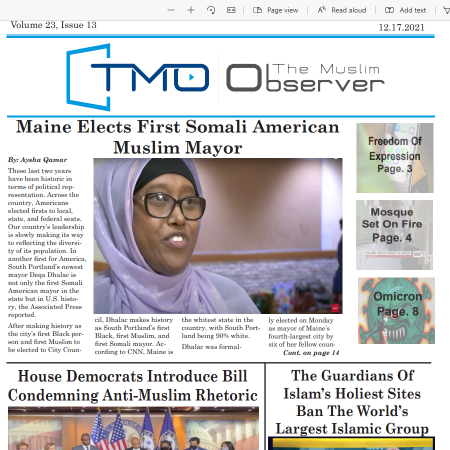Community News (V11-I13)
Halal legislation introduced in N.Carolina
GREENSBORO–In N. Carolina Bill S590 has been introduced which makes it a misdemeanor to label food or food products as kosher or halal without providing information about the authority that authorized the designation. The legislation was sponsored by Sen. Larry Shaw, D-Cumberland.
The bill if passed will make it unlawful to label any repackaged food or food product or display or to offer for sale any unwrapped product that represents the food as halal without indicating the person or entity authorizing the designation by providing the name or symbol of authority or providing a phone number or web site to access the information. Any person violating this law will be guilty of Class 3 misdemeanor.
MSU website to tackle Islam’s inaccurate portrayal
EAST LANSING, MI. — Reporters sometimes underestimate the complexities of Islam and Muslims, according to Michigan State University faculty who will use a grant to create a multimedia Web site designed to foster accurate and balanced reporting of the religion and its followers.
 “If you look at the coverage of Muslims in the press in this country, there are either over- simplifications or distortions – such as combining the terms Arab and Muslim despite the fact that only 20 percent of the world’s Muslims are Arabs,†said Mohammed Ayoob, director of MSU’s Muslim Studies Program and University Distinguished Professor of international relations at James Madison College and the Department of Political Science. “This problem has become particularly acute in the wake of Sept. 11.â€
“If you look at the coverage of Muslims in the press in this country, there are either over- simplifications or distortions – such as combining the terms Arab and Muslim despite the fact that only 20 percent of the world’s Muslims are Arabs,†said Mohammed Ayoob, director of MSU’s Muslim Studies Program and University Distinguished Professor of international relations at James Madison College and the Department of Political Science. “This problem has become particularly acute in the wake of Sept. 11.â€
Add to that commonly misunderstood – and misused – terms like jihad, militant Islam and Islamic fanaticism. And there’s the common belief that all Muslims – regardless of location – are the same.
So to set the record straight, Ayoob and faculty from MSU’s School of Journalism and Muslim Studies Program will soon begin a 15-month project that will yield IMAJE: Islam, Muslims and Journalism Education – a virtual hub of information that addresses how Islam and Muslims have been, and should be, portrayed in the media. The site will be fully functional next spring.
While some journalistic Web sites mention how to report on Islam or Arabs, the IMAJE site will focus solely on the reporting of Islam and Muslims. And with MSU’s proximity to Detroit – which houses the largest mosque in North America and 300,000 to 350,000 Arab-Americans, many of whom are Muslims – the university is well-positioned for such a project, Ayoob said.
“Islam and how it intersects Detroit, Middle East and international politics is a complicated story to tell,†said Geri Alumit Zeldes, MSU assistant professor of journalism. “The Web site will offer examples of ideal and poor reporting on stories and a list of best practices on reporting on Islam to help journalists make sense of this subject matter before trying to inform their masses.â€
Also as part of the project, Zeldes is developing a new master’s level course, “Reporting on Islam,†which will incorporate elements of the site. The course will be offered beginning fall 2009 semester. She and Bob Albers, specialist of telecommunication, information studies and media, are also creating a documentary “Arabs, Jews and the News,†and some of those interviews may be featured on the Web site.
Other planned features of the site include video conversations and essays by MSU Muslim Studies faculty on hot-button issues, a weekly media watch blog and a faculty expert list.
But the site also will focus on issues that often don’t make headlines.
“Part of what we’ll be doing is presenting complex elements of the religion that often are overlooked or neglected – poetry, art, architecture, the cultural wealth associated with Islam – and especially the diversity among Muslims,†said Salah Hassan, associate professor of English and a Muslim Studies core faculty member, who will generate much of the content for the Web site.
In addition to the School of Journalism and Muslim Studies, the $88,000 Social Science Research Council grant was awarded to three of MSU’s Title VI centers: African Studies, Asian Studies and the Center for the Advanced Study of International Development/Women and International Development.
MATRIX: The Center for Humane, Arts, Letters and Social Sciences Online, MSU’s humanities computing center, will provide the technical expertise for setting up and maintaining the Web site.
Ali Vojdani, CEO, UISOL
Ali Vojdani is the CEO of utility industry’s business integration consulatncy UISOL, INC. He leads and directs the company in applying integration and business process management to the challenges of the utility industry.
Vojdani holds masters and doctoral degrees in electrical engineering from McGill University and has 28 years of extensive experience. He served on served on the Technical Committee of the Power Industry Computer Applications (PICA) conference for over a decade. In 2004 he instigated the all new annual Utility Integration Conference (UIC) and has successfully chaired UIC for the last four years. He also regularly conducts training workshops on Business Process Management for utilities. He has authored more than 60 technical articles and reports, and has addressed and chaired numerous technical panels around the globe on issues related to computer applications and business integration in the utility industry.
University Bank receives Banker’s Association Award
ANN ARBOR, MI–University Bank was nationally acknowledged by the American Bankers Association for its innovative programs to increase homeownership opportunities at the American Bankers Association’s National Conference for Community Bankers in Phoenix, Ariz. last month. University Bank received the American Bankers Association’s 2009 Community Bank Award for its achievements in the Helping to Achieve Homeownership category.
The selection committee lauded University Bank for its innovative programs such as home financings for Muslim customers. Muslims are much less likely to be homeowners on average due to religious prohibitions on the payment or receipt of interest. University Bank designed a program to meet these needs, which has so far resulted in over $50 million of financings for the purchase of homes by Muslim customers of the bank. In April 2008, University Bank also established a brand-new FHA lending business that funded $133,420,563 in FHA mortgages in 2008, including $32,125,751 just in December 2008 alone. This business unit now employs 45 people. Due to the changes at FNMA and FHLMC, mortgages originated under FHA guarantees increased from 4% in 2006 to 39.2% in October 2008, the latest month that figures are available. University Bank has held the Federal Deposit Insurance Corporation’s top grade of “Outstanding†for Community Service and Community Investment since 2003 and won U.S. Banker magazine’s “Community Bankers of the Year†award in 2007.
The ABA selection committee awarded 15 Banks out of the 8,635 banks nationwide one of the ABA’s prestigious Community Bank Awards for 2009 based on the innovation, creativity and effectiveness of the University Bank’s approach to making a difference in its community.
11-13














2009
919 views
views
0
comments